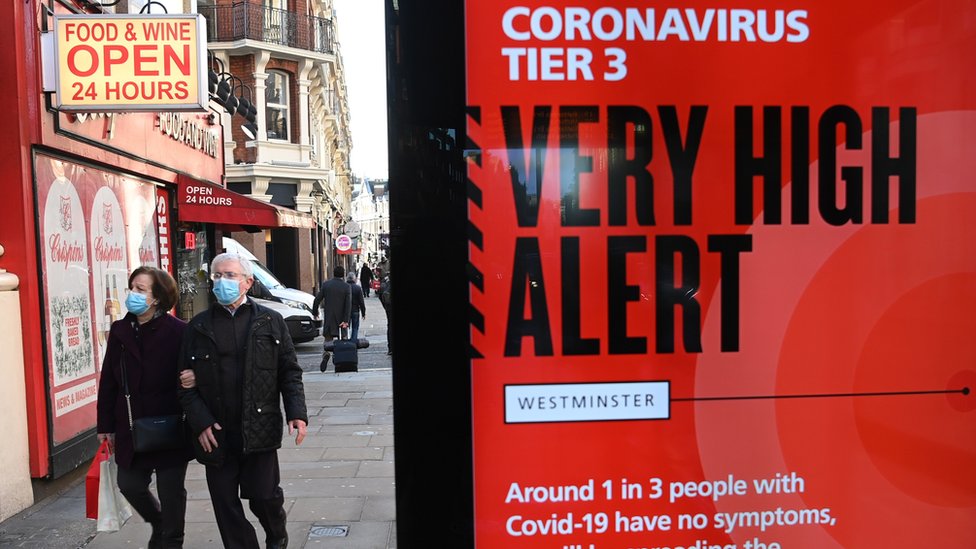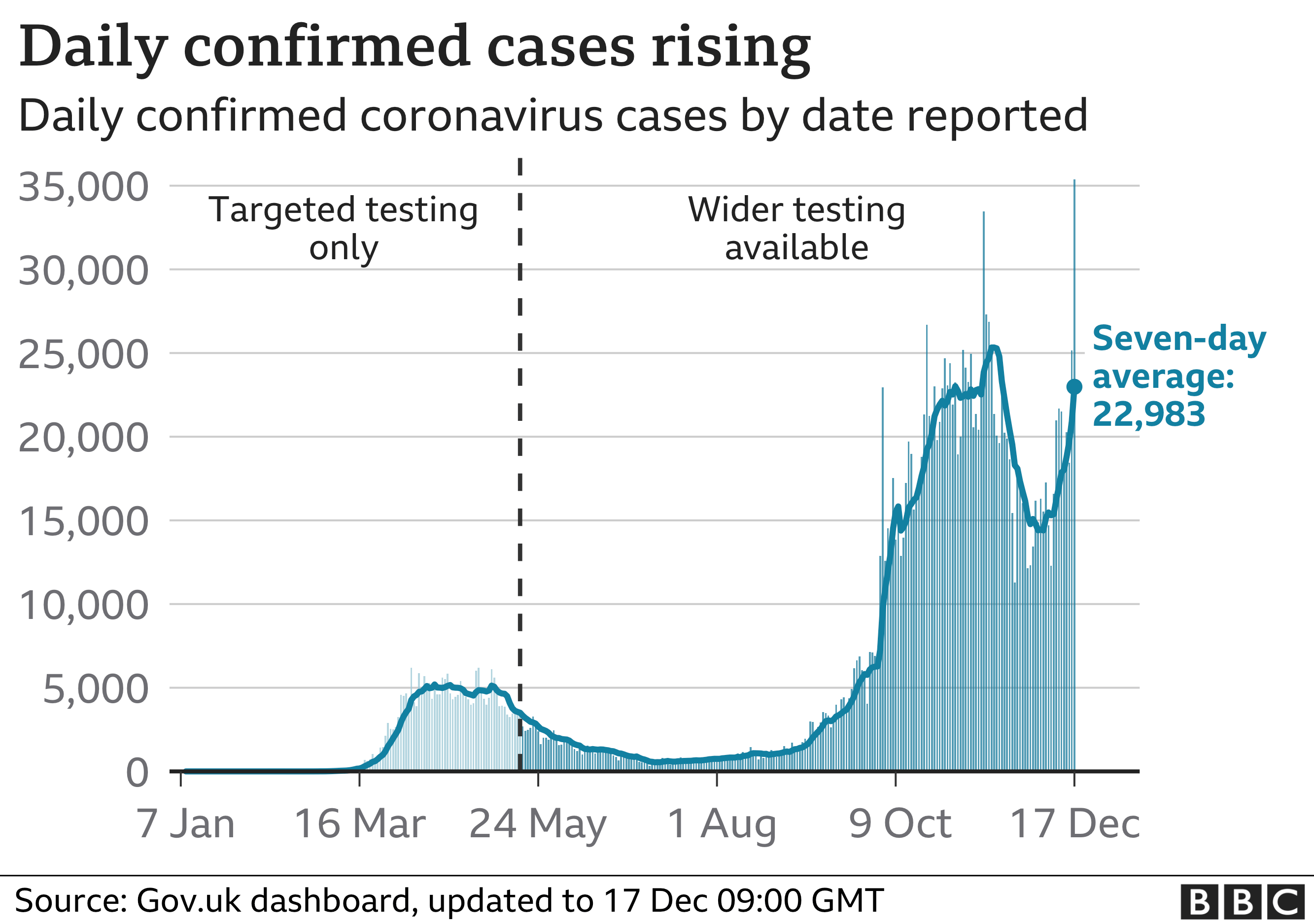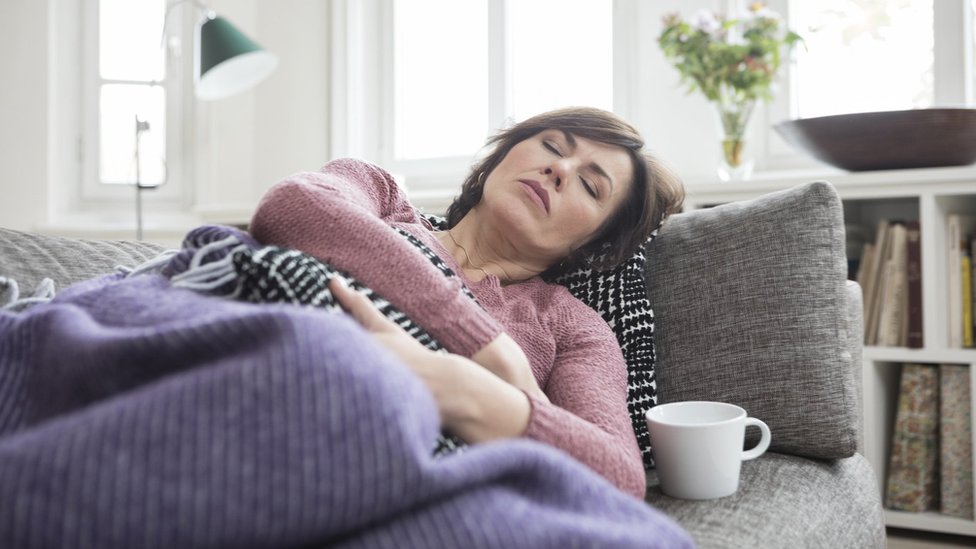Covid: Boris Johnson ‘hoping to avoid’ national lockdown

EPA
PM Boris Johnson says he is “hoping to avoid” another national lockdown in England but he admits Covid cases have increased “very much” in recent weeks.
It comes after Northern Ireland announced a new six-week lockdown from 26 December,
similar to the “sustained” shutdown in March.
Wales had already announced a lockdown from 28 December which will be reviewed every three weeks and has no end date.
Health bosses have warned that the NHS is already under significant pressure.
The president of the Royal College of Emergency Medicine, Dr Katherine Henderson, said England and Scotland needed to do “whatever it takes” to get a grip of the virus, even if that meant “full lockdown”.
In Scotland, the government has warned that tougher restrictions – including a potential lockdown – after the festive period cannot be ruled out.
Meanwhile, head teachers in England say they have been left “broken” by the government’s announcement that the return to secondary school in January will be staggered to allow schools to set up a Covid testing scheme.
They say the move came too late for them to make the necessary preparations but Mr Gibb, the schools minister, has defended the plan, saying the government would provide support.
- Should you see your family at Christmas?
- Which places are moving into tier three?
- Postcode check: Find out the rules where you live
Official figures show infection rates went up in every region of England last week, apart from Yorkshire and the Humber.
Asked whether England would end up following Northern Ireland and Wales into a national lockdown, Boris Johnson said: “Obviously we are hoping very much that we’ll be able to avoid anything like that but the reality is that the rates of infection have increased in the last few weeks.”
He said the Christmas rules – which are being relaxed across the UK between 23-27 December – were “very much a maximum – that is not a target people should aim for”.
The prime minister encouraged people to “think about our elderly relatives” to “avoid spreading the disease” over Christmas.
He added that he hoped next year, with the rollout of the vaccine, would “be very different indeed”.
Earlier, he tweeted a message warning people planning to form “Christmas bubbles” in the UK to start minimising contact with people from outside their households from today.

The new six-week lockdown in Northern Ireland will include closing non-essential shops and close-contact services such as hair salons, while pubs, cafes and restaurants will be restricted to takeaway services.
The first week of the restrictions, running until 2 January, will see even tighter measures with essential shops, including supermarkets, having to close each day by 20:00 GMT.
No sporting events will be permitted at all – even at elite level – with people being urged only to leave their home for essential reasons.
In Wales, non-essential shops will close from the end of trading on Christmas Eve, with an alert level four lockdown starting four days later.
In England, some 38 million people will be subject to the nation’s strictest measures – tier three – from Saturday.
Scotland’s Covid levels and restrictions will be reviewed on Tuesday.
‘Significant pressure’
The decision by all four UK nations to relax restrictions and allow more mixing for five days over Christmas has prompted concern that it will fuel a further surge in case numbers, with medical professionals warning the NHS is already under significant pressure.
Average NHS bed occupancy in England has reached almost 89% for the week ending 13 December, with 59 out of 126 NHS trusts reporting bed occupancy of higher than 90% – which is above the recommended safe level.
Dr Henderson told BBC News the UK was at a “really dangerous point where we could tip into finding it incredibly difficult to manage”.
She said her colleagues were “increasingly” seeing ambulances queuing outside hospitals and it was getting “really difficult” to get them offloaded and sent back out to the next patient, which she described as “a really awful situation”.
Dr Martin Kelly, a consultant respiratory physician in Londonderry, told BBC Radio 4’s Today programme: “Right in the mouth of Christmas we’re seeing a significant further surge in numbers which is already putting the service under significant pressure.”
Dr Nick Lyons, a health board medical director in south Wales, said things were similar in his region, were non-urgent procedures have been cancelled. The intensive care units “were basically full with Covid patients” while the field hospital was “roughly at half its total capacity”, he told Today.
In England, Dr Ganesh Suntharalingam, outgoing chair of the Intensive Care Society, said some hospitals were already operating at capacity – or slightly over – and the prospect of adding a third spike on top of that was “a serious concern”.

Meanwhile, the National Institute for Health and Care Excellence has advised doctors to offer patients in hospital with coronavirus a follow-up six weeks later to check for “long Covid” symptoms.
NICE says the longer-term effects can be “significant”, and has identified 28 of the most common symptoms, from breathlessness and dizziness to chest pain.

- SOCIAL DISTANCING: Can I give my friends a hug?
- FACE MASKS: When do I need to wear one?
- TESTING: How do I get a virus test?
- SYMPTOMS: What are they and how to guard against them?

The UK recorded a further 532 coronavirus deaths on Thursday, taking the total number of people who have died within 28 days of testing positive for the virus to 66,052.
A further 35,383 cases were also recorded on Thursday – but this figure included 11,000 positive cases from Wales that were not previously recorded in official figures.

- VACCINE HESITANCY: Why do some people have concerns about taking a new coronavirus vaccine?
- BRAND NEW THE VICAR OF DIBLEY: Geraldine returns to offer her thoughts about lockdown and social distancing


How will you be affected when your area moves to tier 3? Share your experiences by emailing haveyoursay@bbc.co.uk.
Please include a contact number if you are willing to speak to a BBC journalist. You can also get in touch in the following ways:
- WhatsApp: +44 7756 165803
- Tweet: @BBC_HaveYourSay
- Please read our terms & conditions and privacy policy
If you are reading this page and can’t see the form you will need to visit the mobile version of the BBC website to submit your question or comment or you can email us at HaveYourSay@bbc.co.uk. Please include your name, age and location with any submission.
Published at Fri, 18 Dec 2020 12:58:00 +0000





Comments
Loading…